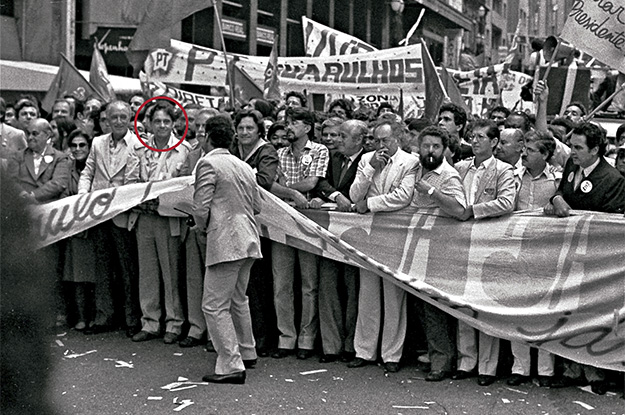Recent years have seen youth-led protest movements erupt throughout Latin America — most notably in Brazil, Chile, Venezuela and Guatemala. How is today different from previous periods of unrest, such as the 1960s? What lessons can be drawn from the past? What are the best available paths for today’s young people to pursue change?
AQ interviewed Fernando Henrique Cardoso, who long before serving as Brazil’s president (1995–2002) was a renowned professor of sociology and a protagonist in two great periods of social upheaval. During the 1960s, Cardoso’s leftist views caused the military government to force him into exile in Chile and then France — where he witnessed the so-called Paris Spring of 1968. In the 1980s, Cardoso participated in pro-democracy protests that helped bring military rule to an end (Cardoso is circled in red above at a 1985 pro-democracy protest, with Luiz Inácio Lula da Silva, bearded and smoking a cigarette, nearby).
Cardoso, now 86, remains active in politics and regularly speaks to young leaders throughout the region. This interview took place at Americas Society/Council of the Americas in New York in June.
Do you think it’s legitimate to compare recent protests in Latin America with what you lived through in the 1960s?
I see more differences than similarities, especially in the way people describe their struggle. In Chile, you saw signs and pamphlets about imperialism, class struggle. When I moved to Nanterre, it was a prosperous time in France, and everyone believed things were stable. The main question inside the university was about sexual freedom, the right for men to enter women’s dorms. But then the explosion came.
An unexpected explosion following a period of prosperity. That sounds like Chile in 2011, or Brazil in 2013.
Expectations are higher after periods of growth. I would say that each generation at one point in time experiences that feeling of, “There is something wrong with the world, and I can do better.” And they have the energy to pursue new solutions.
The difference is that today there is a different sense of what can be accomplished. In the 1960s, we had the confidence that it was possible to make big transformations, based maybe on certain ideologies. Now people look around and they say, “What do you think the world will be like in 20 years?” And nobody knows.
Perhaps this is because of new technologies. We don’t know yet how things will evolve, but we face the risk of more jobless societies. How will we compensate for that? What are we going to do with people if they don’t have jobs? This is the big anxiety behind many of today’s movements, even if people don’t express it that way.
What do you think today’s young Latin Americans really want?
For my generation, the biggest question was how to ensure democracy and freedom. Today, in general terms, we have both in Latin America.
What young people are looking for today is more pragmatic: good schools, clean government, more opportunity. They are not moved by ideology per se. There is also a hunger for social cohesion, because many of the old forms are disappearing. Look what has happened to unions, for example. Today, people are searching for meaning in religion, and in their communities, and looking for a different kind of leader — leaders who they believe can offer real solutions to their problems.
Does that open the door for a new generation of demagogues in Latin America?
I don’t think so, because of the disaster happening in Venezuela. And also to some extent what happened in Cuba. Venezuela is a concrete example of bad management in the name of an idea. So I think people have more pragmatic ambitions. They are less deceived by this kind of rhetoric.
In many Latin American countries, including Brazil, it’s hard to find younger politicians at the national level — most leaders are 65 or older. Why?
Because in Latin America, the old parts of the political establishment are still alive. And the old parts have, for the most part, been unable to connect with the new generations.
Let me tell you a short story. During the last presidential campaign in Brazil, I attended the debate for the main candidates. On the way home, I asked my driver, “What was your impression of the discussion?” He said, “Well, it was interesting. But they were speaking about themselves, not about us.”
I think that’s it. There is no connection between the parties and people’s needs and desires. There is a gap between those on top and the majority.
Wasn’t that always true though?
Well, yes! (laughs) With a difference. Now people have these very powerful instruments to communicate, and they can move and protest almost on their own. They are not connected to institutions. And that’s a problem. Today’s institutions must adapt.
What advice would you give to a young Latin American who is considering going into politics but also feeling like it is not worth it?
I think that what’s important in life is to have hope. To believe that it is possible to change things. So I think for those who are interested in politics, they have to hold on to that — not to adjust to today’s world, but to try to change it.
There are many ways to do this. I spent most of my career completely isolated from political life. I was living in the university, deep in my books, and doing field research in shantytowns, studying the descendants of slaves. For me, politics kind of invaded my life — it was never my intention to become a senator, or president. My objective was always to try to contribute to improving life in Brazil. And that eventually led me into political office.
But that’s not the only path. The key is to accumulate influence to modify things, whatever your role is. And then to act.






